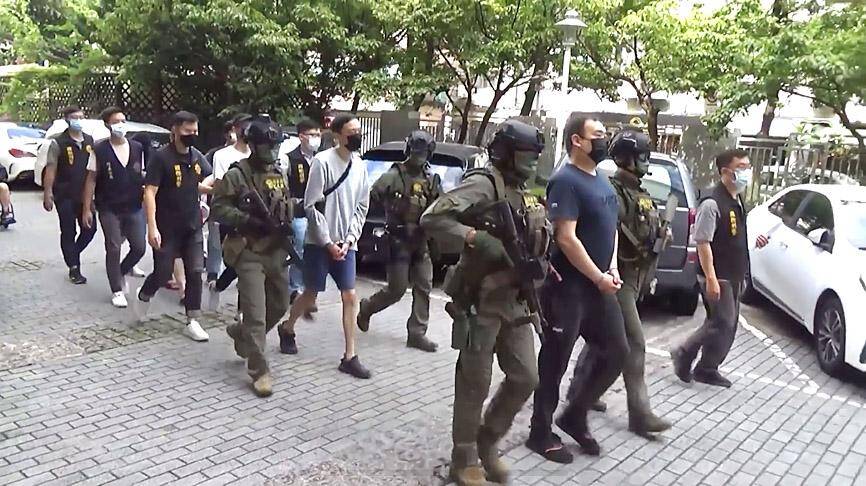The Cabinet yesterday approved a draft amendment of the Organized Crime Prevention Act (組織犯罪條例) to aggravate penalties for criminals involved in luring people into extraterritorial organized crime, after a number of Cambodia-based scam operations were found to have Taiwanese associates.
Currently, according to the Act, the recruitment of people to organized crime would be punished by a jail sentence of between six months and five years and a fine of up to NT$10 million, regardless of whether the crimes take place in Taiwan or overseas.
Under the proposed amendment, any offense related to recruiting Taiwanese to join a criminal organization outside the territory of the Republic of China would result in a prison sentence of between one and seven years, and a fine of up to NT$20 million (US$653,648), according to the Cabinet.

Photo: Chiu Chun-fu, Taipei Times
If offenders target victims who are under 18, the punishment will be increased by up to half.
Meanwhile, the amendment added a clause stating that the property of any group which supports a criminal organization such as providing funding or recruitment shall be confiscated after deducting any amount belonging to victims.
The amendment, drafted by the Ministry of Justice, will be referred by the Cabinet to the Legislature for deliberation.
Should the amendment pass the Legislature, people convicted for involvement in trafficking Taiwanese to Cambodia to work for criminal organizations engaged in activities such as telecom fraud, sexual exploitation and organ removal, shall be subject to the more severe punishment, the ministry said in a statement.
As of Dec. 12, the government has assisted in the return of 403 Taiwanese, many of whom were allegedly lured to Cambodia with offers of fake lucrative jobs and then forced to work for criminal organizations, but around 300 people are believed to still be held in the country against their will, according to the Ministry of Foreign Affairs’ (MOFA) news release.

Alain Robert, known as the "French Spider-Man," praised Alex Honnold as exceptionally well-prepared after the US climber completed a free solo ascent of Taipei 101 yesterday. Robert said Honnold's ascent of the 508m-tall skyscraper in just more than one-and-a-half hours without using safety ropes or equipment was a remarkable achievement. "This is my life," he said in an interview conducted in French, adding that he liked the feeling of being "on the edge of danger." The 63-year-old Frenchman climbed Taipei 101 using ropes in December 2004, taking about four hours to reach the top. On a one-to-10 scale of difficulty, Robert said Taipei 101

Nipah virus infection is to be officially listed as a category 5 notifiable infectious disease in Taiwan in March, while clinical treatment guidelines are being formulated, the Centers for Disease Control (CDC) said yesterday. With Nipah infections being reported in other countries and considering its relatively high fatality rate, the centers on Jan. 16 announced that it would be listed as a notifiable infectious disease to bolster the nation’s systematic early warning system and increase public awareness, the CDC said. Bangladesh reported four fatal cases last year in separate districts, with three linked to raw date palm sap consumption, CDC Epidemic Intelligence

Two Taiwanese prosecutors were questioned by Chinese security personnel at their hotel during a trip to China’s Henan Province this month, the Mainland Affairs Council (MAC) said yesterday. The officers had personal information on the prosecutors, including “when they were assigned to their posts, their work locations and job titles,” MAC Deputy Minister and spokesman Liang Wen-chieh (梁文傑) said. On top of asking about their agencies and positions, the officers also questioned the prosecutors about the Cross-Strait Joint Crime-Fighting and Judicial Mutual Assistance Agreement, a pact that serves as the framework for Taiwan-China cooperation on combating crime and providing judicial assistance, Liang

US climber Alex Honnold left Taiwan this morning a day after completing a free-solo ascent of Taipei 101, a feat that drew cheers from onlookers and gained widespread international attention. Honnold yesterday scaled the 101-story skyscraper without a rope or safety harness. The climb — the highest urban free-solo ascent ever attempted — took just more than 90 minutes and was streamed live on Netflix. It was covered by major international news outlets including CNN, the New York Times, the Guardian and the Wall Street Journal. As Honnold prepared to leave Taiwan today, he attracted a crowd when he and his wife, Sanni,